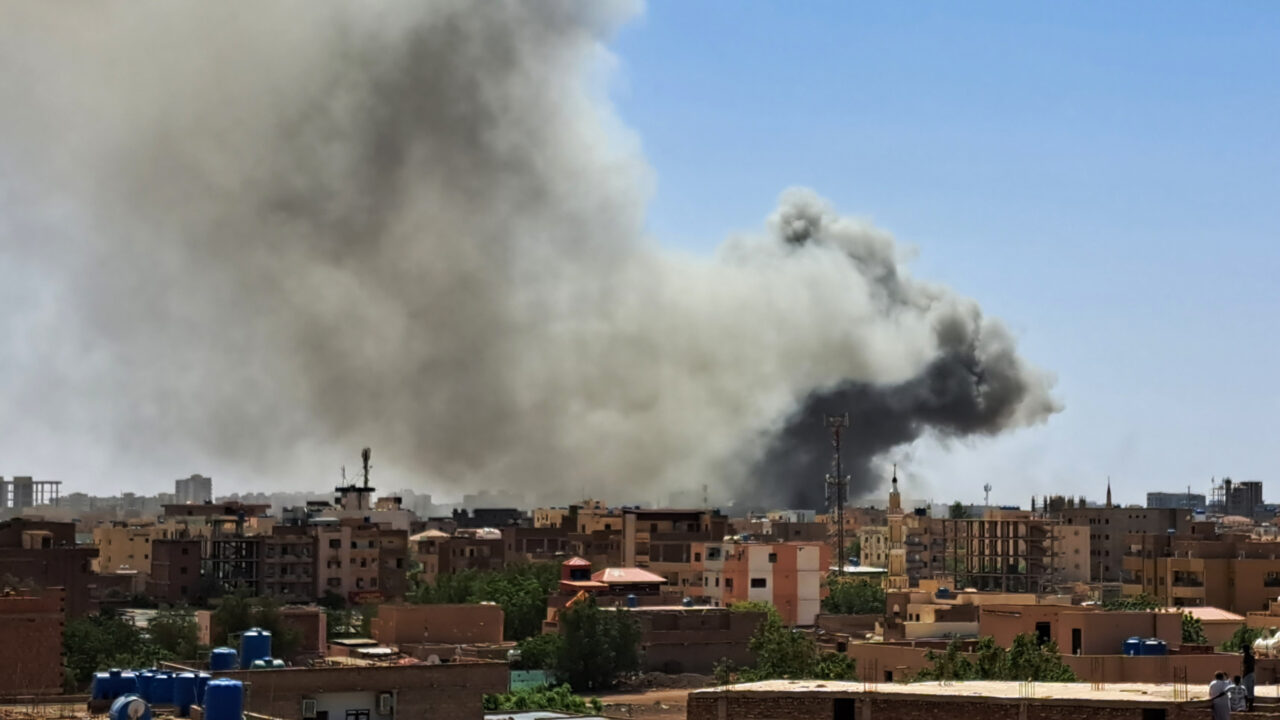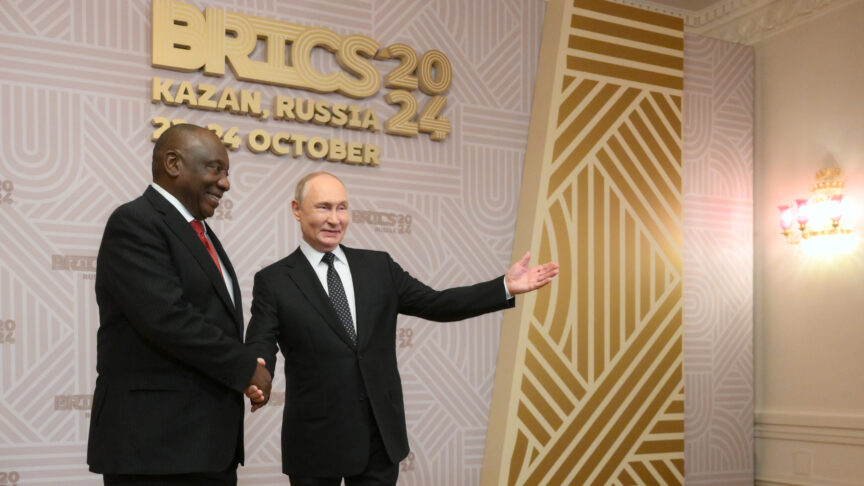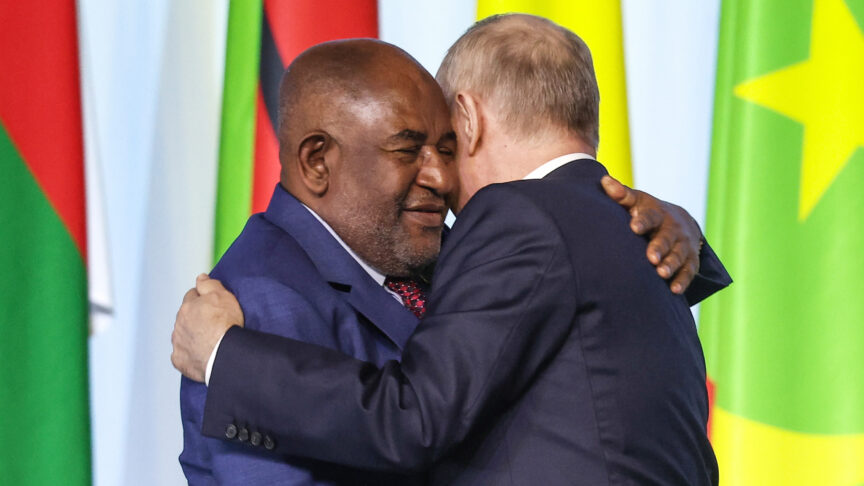Conflict and interests: Why Sudan’s external mediation is a barrier to peace
The war in Sudan has given rise to multiple – and sometimes divisive – mediation efforts. The EU and its member states should aim to help unify these efforts and end the warring parties’ ‘forum shopping’
Sudan could be in the midst of the worst crisis in its history. The conflict has already taken a staggering humanitarian toll, and the country risks state failure. In the past, the various wars in the country’s peripheries tended to pit the state against regional insurgencies. Now, the fighting is between the army – the Sudanese Armed Forces (SAF) – and a supercharged paramilitary actor seeking to replace it – the Rapid Support Forces (RSF).
As befits a fight for control of the entire country, the epicentre of the bloodshed has been the Sudan’s capital, Khartoum. But the warring parties are also attempting to mobilise support in the peripheries, chiefly via communities in Darfur. This instrumentalisation of ethnic fault lines has reignited dormant ethnic conflicts, resulting in crimes reminiscent of the early 2000s genocide. The International Organization for Migration estimates that around 4 million people have been internally displaced, while another million plus have fled to neighbouring countries.
Just as in previous conflicts, external mediation efforts have come thick and fast. Sudan’s seven immediate neighbours and the three across the Red Sea (the United Arab Emirates, Qatar, and Saudi Arabia) all harbour interests in the outcome of the conflict – and Sudan’s elites are well-practiced in cultivating a proliferation of their mediation efforts. Europeans have so far been wise enough not to stoke this damaging ‘forum shopping’ by adding yet another. They now need to make unifying Sudan’s fragmented mediation process a key policy point. European policymakers should make the case for this directly to the Biden administration, circumventing the State Department, which is too invested in the United States’ current – and divisive – mediation efforts to step back.
Sudan’s mediation mayhem
In early May, the US and Saudi Arabia convened the RSF and SAF for talks in Jeddah, Saudi Arabia. This should have been a big tent mediation that incorporated all would-be international mediators and the Sudanese civilian leadership. Instead, the Jeddah platform excluded them, creating the space – and justification – for other forums to emerge. The US thus squandered its traditional cat-corralling power, abetting the multiplication of mediation forums.
Soon, the dominant east African sub-regional organisation, the Intergovernmental Authority on Development (IGAD), joined the fray, propelled by Kenya’s president William Ruto. But IGAD lacks the membership of two other critical regional players, Chad and Egypt. Both these countries bear the heaviest spillover from Sudan’s conflict due to refugee flows: Khartoum’s displaced head to Egypt; those from Darfur land on Chad’s eastern doorstep.
Chad and Egypt bear the heaviest spillover from Sudan’s conflict due to refugee flows: Khartoum’s displaced head to Egypt; those from Darfur land on Chad’s eastern doorstep
Chad and Egypt responded to their exclusion from both Jeddah and IGAD by banding together to establish yet another format: the neighbouring countries initiative. In July, they convened at Cairo’s invitation, with all regional heads of state (including the Central African Republic and Libya) attending the summit.
The African Union’s (AU) inevitable initiative has been lower profile, in part because it focuses on Sudan’s civilians, but also because each of the relevant member states had already invested in other forums: IGAD or the neighbouring countries initiative.
The United Nations anticipated the potential for exclusion from mediation by the AU on the basis of subsidiarity – the principle whereby regional or sub-regional actors such as the AU or IGAD should lead over the UN on African conflicts. To circumnavigate this, the UN had argued for a more inclusive approach – the “extended mechanism” – long before the launch of the AU’s initiative. Far-reaching in its membership criteria, this mechanism now includes some 25 states, IGAD, and the UN’s Sudan Mission: UNTAMS. While this makes the AU’s initiative the most inclusive, the lack of real willingness to participate from the key states prevents that inclusivity from translating into power.
‘Forum shopping’ and barriers to lasting peace
Beyond its neighbour’s interests, Sudan’s political culture encourages the proliferation of mediations via ‘forum-shopping’. The many international negotiations since 2005’s comprehensive peace agreement have schooled Sudanese elites in this form of political arbitrage, whereby the country’s negotiators harness the externalisation of their internal conflict through mediation as a means of creating political capital. Each Sudanese negotiator seeks to build their own external initiative, and then influence the mediator to shape the process in their favour. These multiple forums dilute mediator influence and result in an array of uncoordinated proposals. This becomes especially pernicious when mediators need carrots or sticks to create missing political will on the part of the warring parties: other forums provide an alternative.
The logic informing the Jeddah platform implicitly reasons that limiting participants to the power players – on the Sudanese and international sides – avoids endless, unwieldly multiparty consultations and expedites deal-making in frank, unobserved exchange. But Sudan’s warring parties have now demonstrated, through their repeated failure to uphold even minimal agreements reached in Jeddah, that they lack that requisite political will. Any gain in efficacy that the influence of the US and Saudi Arabia alone could have generated has proven unequal to the task of creating this missing political will. If Jeddah fails to create the missing political will and in fact dilutes international leverage through exclusion, then logic in fact argues against it.
The urgent task at hand is therefore to generate sufficient influence on the warring parties to create political will where too little exists.
The way out
In my conversations with him, the Sudanese political analyst, Amgad Fareid, despairs at the impossibility of unifying the mediation efforts into one. He instead proposes a distant next-best proposal: clarifying the division of labour between the multiple forums. Jeddah should take responsibility for the military and security aspects, Egypt and Chad for humanitarian issues, and the AU and IGAD to develop the longer-term, civilian democratic vision for the transitional government that must follow the silencing of the guns.
So far, the EU and its member states have taken an accepting approach to the multiple initiatives. Behind closed doors, European diplomats confess to feeling incapable of swaying the warring parties, pleading agnosticism on the Jeddah platform. But they now need to get off the fence. The EU and member states should aim to promote a change in the US position by leapfrogging the current State Department lead to make unifying Sudan’s mediation process a topic for discussion with the White House.
Typically, political Darwinism accomplishes survival of the strongest in mediation forums where officialdom fails. Over time, one forum emerges as the last one standing. The problem with that in Sudan today is twofold: too many people are dying to let time accomplish what diplomacy fails to achieve; and an exception to Darwin’s mediation rule emerges when powerful actors, such as the US and Saudi Arabia, are creating the obstacle rather than becoming linchpins to a unified international response.
The European Council on Foreign Relations does not take collective positions. ECFR publications only represent the views of their individual authors.



